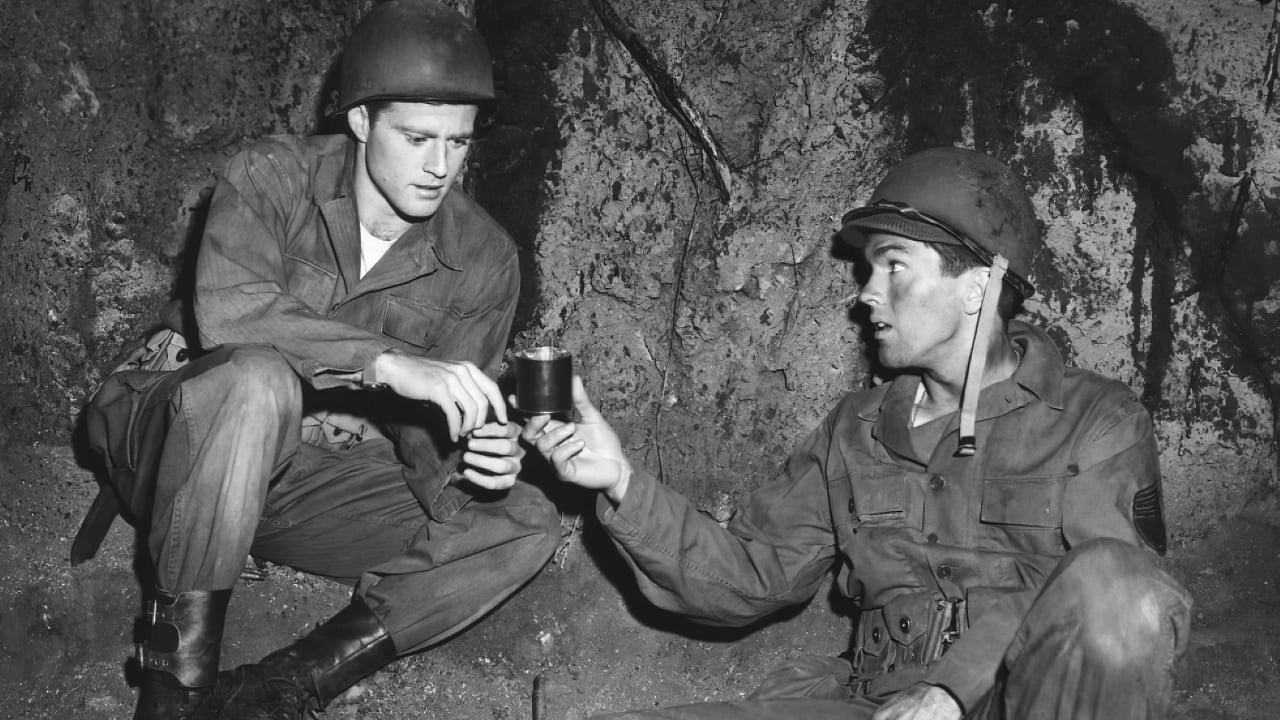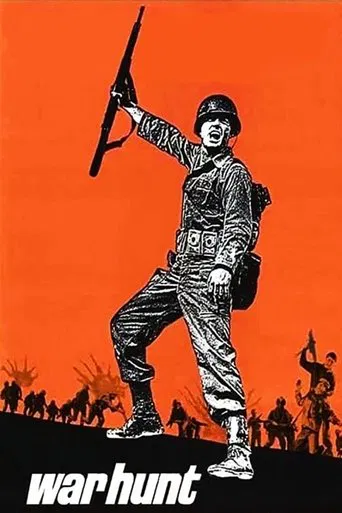

Set in the final months of the Korean War, this is an excellent film which very effectively explores the dehumanising effects of war on its participants. It has a very strong script by Stanford Whitmore and it is well directed by Denis Sanders, though the first 25 to 30 minutes are perhaps a bit too leisurely paced. After that, however, it rollicks along at a great pace and there is a great atmosphere of tension. This was the second of only five films directed by Sanders, which is a shame as he could have become a successful film director if he had more opportunity to hone his craft. This is the first film that I have ever seen about the Korean War, easily the least represented 20th Century war involving the US in Hollywood terms, so that was very interesting. The film ends on July 28, 1953, the day after the armistice that ended the war was signed but it is much more personal significance to me as the day that my dad was born.The film features Robert Redford in not only his starring role but his first credited film appearance. He is quite good as Private Roy Loomis but his acting certainly improved as he got older. Loomis is a new recruit who arrives in Korea in May 1953, by which time negotiations for the armistice are already well underway. He is a very likable character who is necessary to ground the film. In many ways, he is the idealistic all-American boy who does not know what to expect when he reports for duty. His first experience of combat is very effectively depicted as being a traumatising one. As he listens to the artillery bombardment, he stares ahead blankly, hoping against hope that it will end soon. Before his unit withdraws, he is injured and knocked unconscious, only to awake the next morning to find himself alone. He manages to make his way back to the American lines but he is forced to kill a North Korean soldier in order to do so. After this scene, Loomis seems to be more mature and sensible as this rude awakening has allowed him to grow up.While Loomis is the protagonist, the best character in the film is Private Raymond Endore, a cold, distant, detached soldier who exhibits signs of psychosis. The underrated John Saxon gives an excellent performance as Endore, who is allowed to infiltrate enemy lines at night in order to gather information. It is his nightly ritual to kill North Korean soldiers with a knife and draw circles around their bodies. This could indicate that he is a serial killer and that the war is serving as an outlet for him to exercise his murderous desires but I prefer the interpretation that the war exacerbated these preexisting tendencies. One of the reasons that I think is that Endore is not completely without feeling as he does seem to be genuinely fond of Charlie, the young South Korean orphan whom he has unofficially adopted. He wants to take him under his wing and take care of him, even though he goes about doing so in a very warped fashion in that he intends to teach him to kill with a knife as he does. When the armistice is signed, Endore is unable to accept that the war is over and he becomes even more unstable. He has become a professional killer but whether he would have always been one or whether his experience of combat aggravated behaviour that may not have otherwise manifested itself is debatable. Loomis works well as a character in large part because his normal behaviour and attitudes serve as a great contrast to Endore.The film also has a strong supporting cast. Sydney Pollack made his film debut as Sgt. Owen Van Horn but he later focused on his directing career and did not take on another major film role until "Tootsie", which he also directed, 20 years later. He and Redford met on the set of the film and became close friends, leading Pollack to cast him in seven of his films. Charles Aidman is very good as the aptly named Captain Pratt who condones Endore's nightly excursions. I would like to believe that an officer would not do so in reality but I am afraid that they probably would under similar circumstances. Gavin McLeod and Tom Skerritt, whom Redford cast in "A River Runs Through It" 30 years later, have nice but smaller roles as Private Crotty and Sgt. Showalter. McLeod brings a few occasional moments of comic relief which I appreciated as they served to break the tension. Tommy Matsuda, one of the few people in the film who doesn't fall into the "Before They Were Famous" category, is great as Charlie. It is a shame that this was his only acting role as he could have had a solid career. Francis Ford Coppola makes an uncredited appearance as an army truck driver. In a bizarre coincidence, this means that the cast of the film includes three men who later directed Best Picture winners since Coppola directed "The Godfather" and "The Godfather Part II", Redford directed "Ordinary People" and Pollack directed "Out of Africa", in which Redford appeared. All three of them also won Best Director.Overall, this is a very strong film which is at times quite disturbing in its portrayal of the effects that warfare can have on a person. It is also a great indication of what you can do with a low budget but a good script and good director.
... View MoreIt's May 1953, and fresh-faced US Army recruited Robert Redford (as Roy Loomis) has joined the battle for Korea. Women in the area greet the American private by saying, "Welcome to Korea, I hope you don't die" and "I love you." Mr. Redford soon notices strange behavior from fellow handsome private John Saxon (as Raymond Endore). A loner, Mr. Saxon nightly paints his face, stealthy makes his way into enemy territory, single-handedly kills an enemy soldier, and performs a ritual Indian dance over the body.Redford finds Saxon's behavior troubling, and tries to separate the increasingly disturbed man from his only friend, eight-year-old Tommy Matsuda (as Charlie). The orphaned Korean lad has formed a hero-worshiping relationship with Saxon, which Redford seeks to sever. There are things to admire about this inexpensively made anti-war drama, especially Saxon's characterization, but the film makes the old symbolic points rather ordinarily and the new ones haphazardly. Some character motivation is noticeably lacking.***** War Hunt (4/6/62) Denis Sanders ~ Robert Redford, John Saxon, Sydney Pollack, Tom Skerritt
... View MoreDark, atmospheric, stylish film telling the story of combat as seen through the eyes of a newcomer, baby-faced Robert Redford, at a wartime trench camp in Korea, 1953. The story basically follows this man's experiences dealing with the others in their little platoon barracks - particularly a very odd man (played by John Saxon) who first appears on screen in a most memorable style - his mud-covered face suddenly appearing in close-up, completely filling the screen. This man likes to go out alone at night with his face darkened, on his own private "war hunt" as he knifes to death Koreans hiding in trench holes. This man's sidekick at camp is a young, orphaned Korean boy who seems to worship the older man. At one point, we watch Redford's character as he faces great fear during his first experience in combat; he also desires to help the young boy and faces many confrontations with the "war hunter"/mud man.This is a very unusual film - powerful, gripping and interesting, the story moved along via voice-over narration by Redford as his character relates his experiences. The film features excellent, thoughtful camera-work including many facial close-ups, and many dark, night-time scenes that gives a haunting feeling to the action. The background music reminded me in style of that often heard during "Twilight Zone" or even "Star Trek" episodes - a sort of 60s sci-fi feeling to it, in a way. The film opens and closes with a nicely done, sentimental chorus of Korean children. An excellent film all around.
... View MoreThe 'psychotic' hero is an essay captured in two fine War films: Donald Siegal's "Hell Is For Heroes" the story of a sergeant who for being psychotic embarked on suicidal heroic missions, and our distinguished film "War Hunt."The picture is clearly stated and openly defined... Pvt. Raymond Endore (John Saxon) goes out at night on 'solitary' patrols... The information he brings back is very useful for Capt. Wallace Pratt (Charles Aidman) whose posture toward Endore is 'paternal' gratification...But the strong reason to his voluntary patrol is to murder... He is a ritual killer practicing a formal act with his knife, and after finishing with his victim, he stands behind the body in mystical meditation...Even after the cease-fire on the Korean front, Endore extends his night patrols... This 'psycho' mind is already sick, and there is nothing to be done to narrow his actions...With just one major battle scene, "War Hunt" is absolutely a penetrating study of War drama, focusing on its traumatic effects: The 'fighting' soldier and the 'non-fighting' man..."War Hunt" is ingenious, deeply stimulating, and cautiously photographed... The extraordinary hand-to-hand fight, between Redford and the Chinese soldier, proves it...John Saxon is terrific as the tormentor and Robert Redford (in his film's debut) is excellent as the idealistic Pvt. Roy Loomis...
... View More